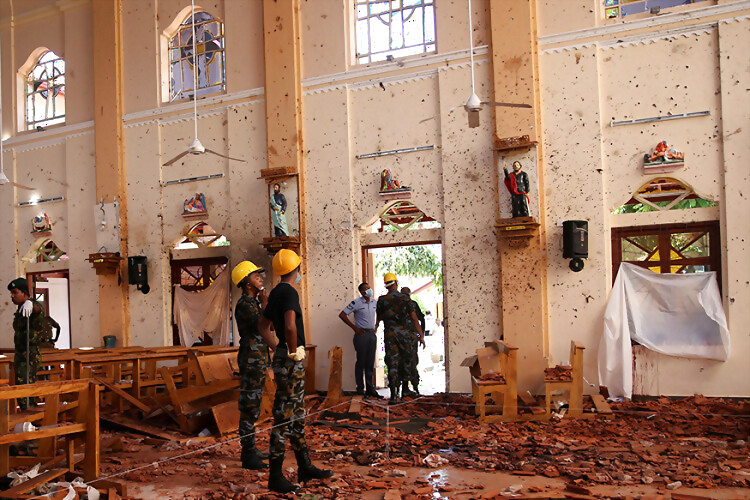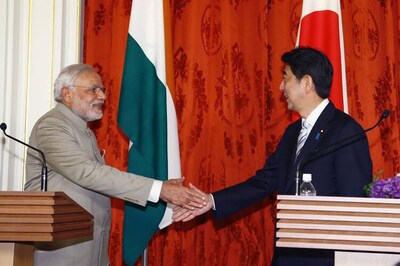
views
Sunday’s terror attack, the deadliest in Sri Lanka since the end of war with the LTTE, has divided Lankan politics even further.
President Maithripala Sirisena and Prime Minister Ranil Wickremesinghe, who recently had a major fallout, have to work together to heal the country and to put an end to new kind of religious terrorism threatening to engulf the island nation.
But just a day after the horrific serial bomb blasts that killed 290 and injured over 500 people, knives are out and the blame game has begun.
When the bombs exploded at churches and 5-star hotels in Sri Lanka, Wickremesinghe was at an Indian Ocean resort town, Bentota, south of national capital Colombo.
The President was in Singapore. The Prime Minister immediately rushed back to Colombo to take control of the situation and the President took almost 24 hours to return home.
A visibly shaken PM told the media that intelligence warnings about a coordinated, massive attack was not shared with him or the Cabinet, and if the inputs had been shared in time, a tragedy of this proportion would have been averted.
Since the President, in an “illegal” order, made the police report to him after the October 2018 coup, the PM was actually blaming Sirisena for the blasts. They already share a cold relationship and the attacks may widen the rift further.
Health Minister Rajitha Senaratne has already blamed the President indirectly for the tragedy that struck on Easter Sunday.
Former President Mahinda Rajapaksa’s clan, which lost to Wickremesinghe in a failed coup just four months ago, has sensed a huge political opportunity in the current crisis.
Mahinda’s younger brother and former defence secretary Gotabaya Rajapaksa, who successfully led the war against the Liberation Tigers of Tamil Eelam (LTTE) just 10 years ago, has emerged as a possible successor to incumbent Sirisena.
Known as just ‘Gota’ in Sri Lanka, the younger Rajapaksa has already announced his desire to contest in the presidential elections due at the end of the current year.
An American citizen, Gota has already applied for the relinquishment of the US citizenship and started the backroom campaign. Immediately after the blasts rocked the nation, both Mahinda and Gota came out denouncing terrorism in the strongest words. They blamed the current government for a tragedy of this magnitude.
After Sunday’s attacks, there has been a huge change in the mood of the islanders. According to local media, many think that someone like Gotabaya can end the new terrorism the same way he ended the Tamil separatist guerrillas.

A view of the damage at St. Sebastian Catholic Church, after bomb blasts ripped through churches and luxury hotels on Easter, in Negambo, Sri Lanka. (Image: Reuters)
The Rajapaksa clan was hitherto banking on the failures of the Sirisena-Wickremesinghe government on economic issues to counter them in the elections. After the attack, it will not take much for them to convince the people that the current government has failed on all counts, including national security.
Rajapaksa’s supporters are already calling for the family’s return. The clan is more or less decided on the candidature of Gotabaya as the Sri Lankan Constitution forbids more than two terms for president. Mahinda, however, is keeping the cards close to his chest and claiming that he is still eligible to seek a third term.
But insiders feel that it will be Gotabaya who would replace his elder brother Mahinda in the presidential elections.
According to Colombo Page, Gotabaya has been served notices in the US, charging him in two cases of torture and murder during war time. The two cases have been filed by the daughter of murdered editor, Lasantha Wickremetunga, and a Tamil torture survivor.
After his arrival, Gotabaya has reportedly dismissed the lawsuits filed against him as "baseless" and stressed that it will only motivate him and his supporters to push for political change in Sri Lanka.
A Tamil resident of Colombo, who did not wish to be identified, said war crime allegations against Gotabaya are not a big issue in the elections and majority Sinhalese voters like his strong-arm tactics.
“After the bomb blasts, he will be more popular because of his image. People want a strong leader who can end terrorism. Gotabaya perfectly fits their requirements. Sirisena is not just weak, he is also cunning. No one likes him. The UNP led by Wickremesinghe is facing too many issues; both internal and external,” he said.
According to political analyst Edward Theophilus, statistically based on the census of 2012, 28.7% of voters in Sri Lanka are in Western Province, 12.6% in Central Province, 12.2% in Southern Province and 11.7% in North Western and 34.8% live in other provinces.
This means Gotabaya Rajapaksa must focus on his campaign mainly in these provinces and lead a reasonably convincing campaign in other provinces. He must send a uniform message that his priority is to give equality without racial, religious and divisional differences.
Racial mix of voters is 74.9% Sinhala, 11.2% Sri Lankan Tamils, 4.2% Indian Tamils and 9.3% Sri Lankan Muslims. Rajapaksa needs to attract 80% of Sinhala votes, 6% of Lanka Tamil votes, 2 % Indian Tamil votes and 6% Muslim votes to show a great victory in presidential elections.
On the other hand, the UNP is yet to decide its candidate in the presidential elections. The names of Ranil Wickremesinghe, and ministers Sajith Premadasa and Champika Ranwaka are doing the rounds.
The advantage, however, seems to lie with the SLPP in a panic-stricken nation which does not want to witness a repeat of Sunday’s carnage.


















Comments
0 comment